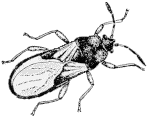Chinch Bugs
Pest Management Fact Sheet #5009
James F. Dill, Pest Management Specialist
Clay A. Kirby (retired), Insect Diagnostician
For information about UMaine Extension programs and resources, visit extension.umaine.edu.
Find more of our publications and books at extension.umaine.edu/publications/.
Introduction
 Chinch bugs cause serious damage in the thick turf of lawns and golf courses. Dying or dead areas of a lawn can signal the presence of this pest. Dry seasons seem to favor its spread and make its damage more noticeable. Chinch bugs tend to be more of a problem in southern Maine.
Chinch bugs cause serious damage in the thick turf of lawns and golf courses. Dying or dead areas of a lawn can signal the presence of this pest. Dry seasons seem to favor its spread and make its damage more noticeable. Chinch bugs tend to be more of a problem in southern Maine.
Description & Biology
The chinch bug generally produces two generations per year after over-wintering in the adult stage in plant debris, crevices, and thatch. The insect mates early in the season when the temperature reaches 70°F. The female lays eggs on roots, stems and leaves over a two to three-week period. One female can lay as many as 500 eggs.
The newly-hatched bugs–tiny, wingless, bright red nymphs–feed by sucking juices from roots near or at the ground surface. The young bugs turn black as they rapidly grow larger. After 40 to 50 days of voracious feeding, they reach the mature stage and develop wings. The adult chinch bug is shaped like a flattened black and white capsule and is capable of flight. It is about 1/5 inch. Adults of the first brood usually move to a new area before mating and egg-laying.
Chinch bugs do the greatest damage from mid-summer to early fall. The first generation starts to die in early fall. The second generation hibernates at the approach of cold weather in matted clippings and debris, or in loose soil near the root zone.
Management
A coffee can with both ends cut out can be used to detect the presence of the bugs. Force one end of the can into the soil, fill with water, then watch for chinch bugs to float to the top.
Because they can fly, it is difficult to keep an area free of chinch bugs if they occur in nearby cropland. However, sanitation may reduce over-wintering sites. In addition, both liquid and granular forms of insecticides may be used. Many people prefer liquid spraying since the material must reach the crown area of the grass plant.
The best time to apply a pesticide for chinch bug control is in early June. It is advisable, regardless of the form of insecticide used, to remove any built-up thatch before the application and use enough water to get the pesticide to the feeding zone of the insects. This is a good reason to water turf grass before treatment and apply water to areas that are treated with a granular product.
Carbaryl (Sevin), bifenthrin, cyfluthrin, or imidacloprid are registered for chinch bug control. Application rates depend on the size of the area to be treated, so follow the directions on the label.
When Using Pesticides
Always Follow Label Directions!
Pest Management Unit
Cooperative Extension Diagnostic and Research Laboratory
17 Godfrey Drive, Orono, ME 04473
1.800.287.0279 (in Maine)
Information in this publication is provided purely for educational purposes. No responsibility is assumed for any problems associated with the use of products or services mentioned. No endorsement of products or companies is intended, nor is criticism of unnamed products or companies implied.
© 2016 | Reviewed: 2023 and 2025
Call 800.287.0274 (in Maine), or 207.581.3188, for information on publications and program offerings from University of Maine Cooperative Extension, or visit extension.umaine.edu.
The University of Maine System (the System) is an equal opportunity institution committed to fostering a nondiscriminatory environment and complying with all applicable nondiscrimination laws. Consistent with State and Federal law, the System does not discriminate on the basis of race, color, religion, sex, sexual orientation, transgender status, gender, gender identity or expression, ethnicity, national origin, citizenship status, familial status, ancestry, age, disability (physical or mental), genetic information, pregnancy, or veteran or military status in any aspect of its education, programs and activities, and employment. The System provides reasonable accommodations to qualified individuals with disabilities upon request. If you believe you have experienced discrimination or harassment, you are encouraged to contact the System Office of Equal Opportunity and Title IX Services at 5713 Chadbourne Hall, Room 412, Orono, ME 04469-5713, by calling 207.581.1226, or via TTY at 711 (Maine Relay System). For more information about Title IX or to file a complaint, please contact the UMS Title IX Coordinator at www.maine.edu/title-ix/.

